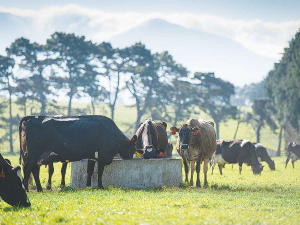No free ride!
OPINION: This old mutt is getting somewhat tired of multi-national, tax-dodging, fund-raising group Greenpeace always given front and centre mainstream media space to coment (i.e. bag) NZ agriculture.
 Putting a price on agricultural emissions could come at the cost of 54,600 jobs, a BusinessNZ report says.
Putting a price on agricultural emissions could come at the cost of 54,600 jobs, a BusinessNZ report says.
OPINION: As we wait for the Government to unveil its plan on pricing agricultural emissions, a new report spells out what could be in store for rural New Zealand.
Putting a price on agricultural emissions could come at the cost of 54,600 jobs, the BusinessNZ report says. BusinessNZ assessed the impact of those emission charges on both upstream industries that are "critically dependent" on farming and downstream meat and dairy processing industries.
It identifies Southland, Waimate, Wairoa and South Taranaki as especially hard hit from reduced farmer spending on fertiliser, veterinary and agricultural support services and downstream meat and dairy processing industries.
Pricing agricultural emissions will be 'devastating' for some communities. The report warns that there will be flow-on effects to other parts of local economies as incomes and spending power are lost. Some communities will be devastated, and some are likely to become unviable through employment and population loss.
Farmers point out that the report underlines why the Government needs to think very carefully about the timing, structure, and impact of any move to price agricultural emissions.
For most New Zealanders, the cost of living and looming economic downturn are front of mind, and that includes farmers, who are really struggling with huge cost increases.
For the rural sector there's also increased costs, declining incomes, staff shortages and the ongoing impacts of Cyclone Gabrielle.
Former Federated Farmers president, now ACT candidate, Andrew Hoggard, has made his views clear: farmers won't support emissions pricing until there is a view of the current methane reduction targets that takes the different warming impact of methane into account. He says our current methane targets are unrealistic, unscientific, and they go further than is needed to stop farming's contribution to warming.
"We are never going to support a 10% 2030 target that drives a 20% reduction in sheep and beef and a 5% reduction in dairy, while plastering our countryside in pine trees and hollowing out rural communities."
The farming community is waiting for the Government to release its agricultural greenhouse gas emissions levy.
The Government must get the settings right to protect the viability of our rural communities and our economy. If we don't, we will just end up exporting jobs and emissions instead of meat and milk, and the planet will be no better off for it.
New Zealand farmers are the most efficient in the world when it comes to producing milk and meat. Let's keep it that way.
New Zealand and Chile have signed a new arrangement designed to boost agricultural cooperation and drive sector success.
New DairyNZ research will help farmers mitigate the impacts of heat stress on herds in high-risk regions of the country.
Budou are being picked now in Bridge Pā, the most intense and exciting time of the year for the Greencollar team – and the harvest of the finest eating grapes is weeks earlier than expected.
The Real Estate Institute of New Zealand (REINZ) has released its latest rural property report, providing a detailed view of New Zealand’s rural real estate market for the 12 months ending December 2025.
Rural retailer Farmlands has released it's latest round of half-year results, labeling it as evidence that its five-year strategy is delivering on financial performance and better value for members.
OPINION: "We are back to where we were a year ago," according to a leading banking analyst in the UK, referring to US president Donald Trump's latest imposition of a global 10% tariff on all exports into the US.
OPINION: Expect the Indian free trade deal to feature strongly in the election campaign.
OPINION: One of the world's largest ice cream makers, Nestlé, is going cold on the viability of making the dessert.